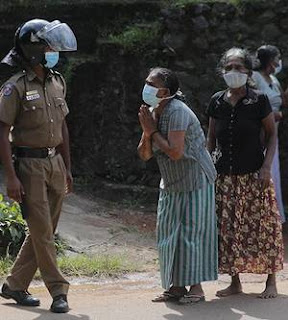By Anthony Vinoth, Coordinator - Sri Lankan Collective Against Torture
We highlight that the security of
the prisoners in state custody lie on the government and expect the
authorities will provide a credible explanation to the society about the
incident.
We want to remind that local and
international civil organizations have focused the attention of the government
many times to the elongated issue of congestion in prisons of Sri Lanka. We
believe that COVID-19 would not make the prisons so vulnerable if the
government had taken steps to provide sustainable solutions to minimize prison
congestion. Several civil organizations, including the Committee to Protect the
Rights of the Prisoners informed the authorities several times that spread of
the epidemic in the prisons might cause panic among detainees. We stress that
the cause for the unfortunate situation in prison is the failure of the
authorities to take timely action. As a result, chaos has been reported from
several prisoners by now.
Two detainees lost lives in
Anuradhapura prison amidst the first corona wave as a result of using live
rounds to control the chaos. On November 18, one detainee of Bogambara prison
died due to gunshot injuries. We focus the attention to the section 13 (4) of
the constitution of Sri Lanka which highlights “No person shall be punished
with death or imprisonment except by order of a competent court, made in
accordance with the procedure established by law.”
The killings that took place in
prisons within a brief period degrade
Sri Lanka in the human rights indices while affecting the dignity of the
state internationally.
Even before the postmortem, the
new Minister of Prison Management Hon. Lohan Ratwatta said in the parliament
that no prisoner had died of gunshot injuries in the Mahara incident. This
statement by the Hon. Minister was contradicted when the state counsel
representing the Attorney General reported to the Magistrate of Welisara on
December 8 that Criminal Investigation Department probes had revealed the use
of firearms. The Sri Lankan Collective Against Torture protests the Minister’s
statement in this context. We further demand the Department of Prisons to
immediately hand over the unedited copies of the videos shown on media together
with the equipment used to record them to the Magistrate Court of Welisara for
further investigations.
Also, we demand the government
not to cremate the dead bodies of these detainees as per the quarantine
regulations. We respect the interim order issued by Hon. Magistrate of Wattala
on December 4 preventing the cremations.
Hon. Magistrate of Welisara has
directed the government to provide expert opinion regarding the postmortems,
and we urge the authorities to take immediate actions in terms of this
direction. In the context of the investigations after the exhumation of the
bodies of the murdered persons had changed the initial postmortem reports, we
emphasize that the government should conduct fair and independent inquests in
terms of these nine killings. The cremation of the dead bodies considering the
victims of killings as COVID-19 patients may hide evidence of murder, we
stress. Therefore, we urge the government to use suitable techniques such as
X-ray and conduct investigations without causing injustice to the victims of a
crime and the families of the victims. The responsibility of a democratic
government is to conduct murder investigations transparently and independently.
Sri Lanka is lagging regarding
delivering justice to the victims of similar crimes that occur in the prisons
quite often. The case regarding the killing of 27 prisoners in Welikada prison
on November 9, 2012, is yet to be examined. However, accelerating the process
of justice concerning exceptional circumstances is unalienable responsibility
of the government.
Sri Lankan Collective Against
Torture extends its fullest corporation unconditionally to its member
organization, Committee to Protect the Prisoners’ Rights, in their struggle to
seek justice for the victims of this incident and also to increase the security
and facilities in the prisons.
(Translated by Creative Content Consultants)






No comments:
Post a Comment